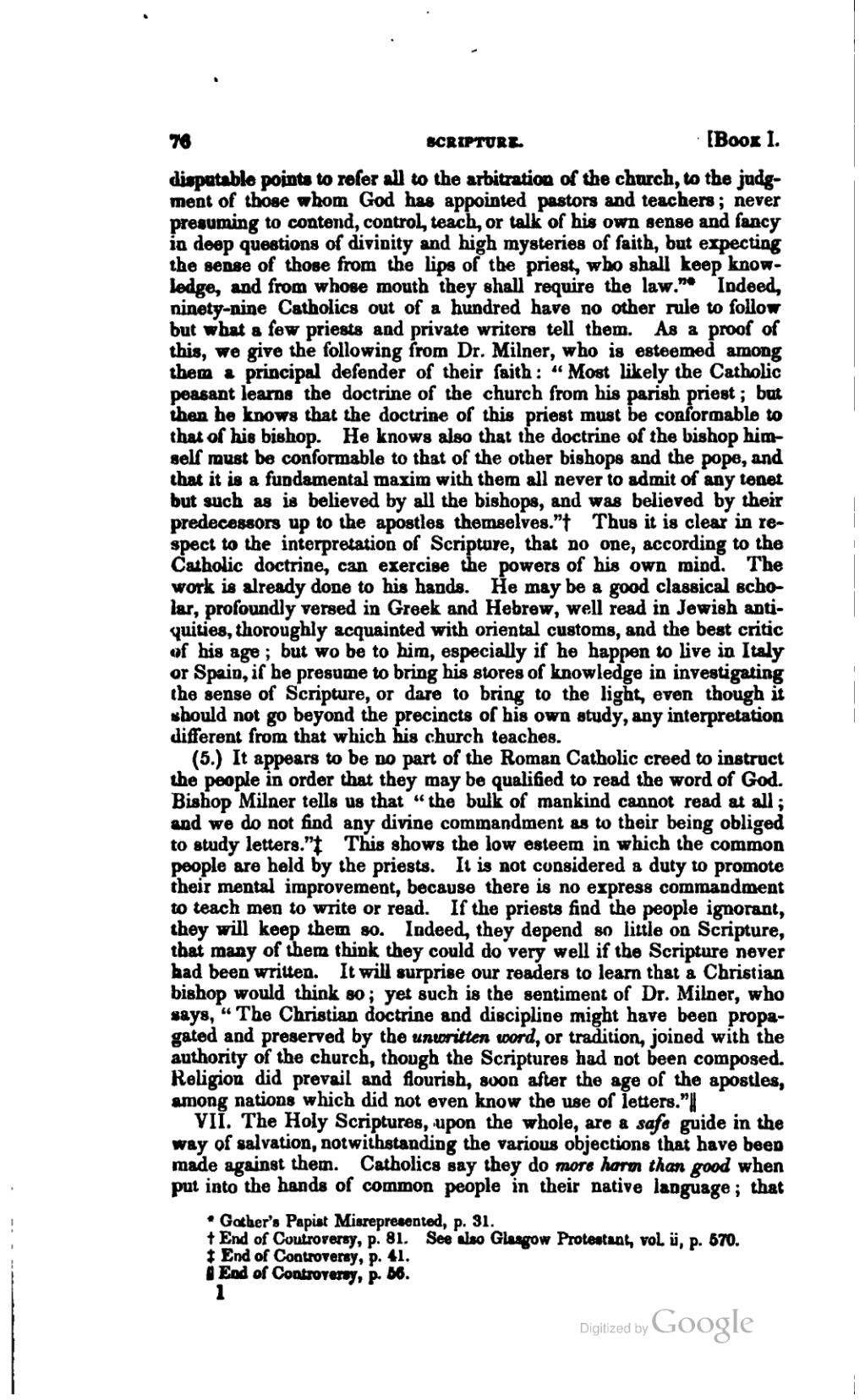[Boos I. points to refer to the arbitration of' the church, to the judg- ment of those whom ? has appointed pastors and teachen; never presuming to contend, control, teach, or talk of his own sense and fancy in deep questions of divinity and high mysteries of faith, but expecting the sense of those from the lips of the priest, who shall keep know- ledge, and from whose mouth they shall require the law.*** Indeed, ninety-nine Catholics out of a hundred have no other rule to follow but what a few priests and private writers tell them. As a proof of this, we give the following from Dr. Milner, who is esteemed among them & principal defender of their faith: "Most likely the Catholic peasant learns the doctrine of the church from his parish priest; but than he knows that the doctrine of this priest must be conformable to that of his bishop. He knows also that the doctrine of the bishop him- self must be conformable to that of the other bishops and the pope, and, that it is a fundamental maxim with them all never to admit of any tenet but such as is believed by all the bishops, and was believed by their predecessors up to the apostles themselves." Thus it is clear in re- spect to the interpretation of Scripture, that no one, according to the Catholic doctrine, can exercise the powers of his own mind. The work is already done to his hands. He may be a good classical scho- htr, profoundly versed in Greek and Hebrew, well read in Jewish anti- qu/t/es, thoroughly acquainted with oriental customs, and the best critic ,?f his age; but we be to him, especially if he happen to live in Italy or Spain, if he presume to bring his stores of knowledge in investigating the sense of Scripture, or dare to br/ng to the light, even though it should not go beyond the precincts of his own study, any interpretation different from that which his church teaches. (�It appears to be no part of the Roman Catholic creed to instruct the people in order that they may be quaflied to read the word of God. Bishop Milner tells us that "the bulk of mankind cannot read at all; and we do not find any divine commandment as to their being obliged to study letters."? This shows the low esteem in which the common people are held by the priests. It is not considered a duty to promote their mental improvement, because there is no express commandment to teach men to write or read. If the priests/ind the people ignorant, they will keep them so. Indeed, they depend so little on Scripture, that many of them think they could do very well if the Scripture never had been written. It will surprise our readers to learn that a Christian bishop would think so; yet such is the sentiment of Dr. MiLner, who says, "The Christian doctrine and discipline might have been propa- gated and preserved by the uatm'/gtm word, or tradition? joined with the author/ty of the church, though the Scriptures had not been composed. Religion did prevail and flourish, soon after the age of the apesdes, a?nong nations which did not even know the use of letters.'*? VII. The Holy Scriptures, .upon the whole, are a ?afe guide in the way of salvation, notwithstanding the var/ous objections that have been made against them. Catholics say they do more Aarm tia? ? when put into the hands of common people in their native language; that
- eelher's Pap/st ]Misrepresented, p. $1.
t End of Cout. roversy, p. 81. See dee Ola?ow Prot?tant, vol if, p. 570. $ End of C, ontrovemy, p. 41. fl End d C, outnnemy, p. ?6. 1
�
